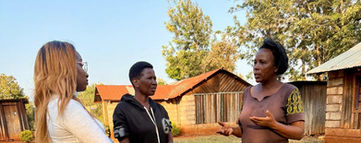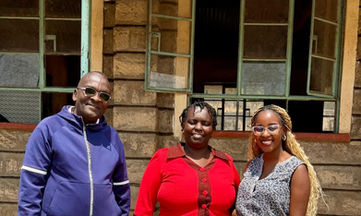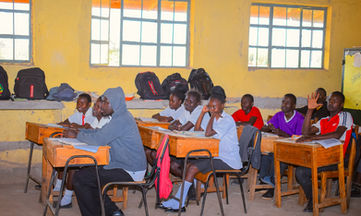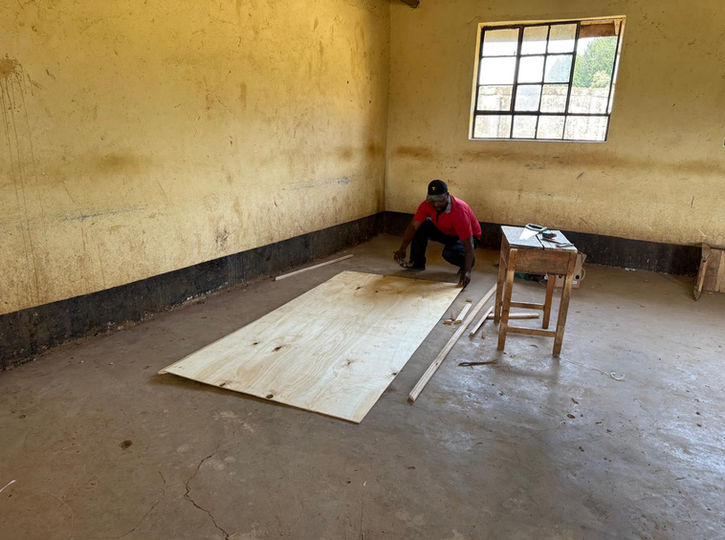
THE NEED
Across Kenya, young people are growing up in environments where emotional struggles often go unseen. Many are carrying heavy stories of poverty, trauma, family challenges, or pressure to perform, with very little space to talk about how they feel. In schools, teachers are doing their best but often feel burnt out and unsupported. Students are losing confidence and struggling to stay engaged.
Since the majority of the population is struggling just to meet their basic needs, their mental health is often neglected. According to the National Council for Population and Development, 44% of adolescent Kenyans have a mental health problem, and 1 in 5 Kenyans will have a mental illness at some point in their lives. And yet 75% Kenyans do not have access to mental health services. In addition, many of the mental health programs available to them are not culturally appropriate and therefore minimally effective.
We believe mental wellbeing is not a side issue. It’s the foundation of learning, growth, and strong communities. When teachers feel supported, they can show up fully for their students. When students feel safe and understood, they can thrive. Our work is about making that possible in every classroom.

OUR MISSION
Our mission is to transform education in Kenya by placing mental health at its core. By equipping classrooms with tools for healing, empathy and resilience, we’re breaking cycles of trauma and helping communities see mental health as a shared journey, not a stigma.
OUR APPROACH
We use a Social and Emotional Learning (SEL) model that is simple, practical, and hands-on.
Every step is grounded in real connection. We believe lasting change happens when people feel part of the process, not when solutions are handed down to them. Our sessions are participatory, fun, and relatable. We bring people together to talk, laugh, and sometimes cry, in spaces where everyone feels seen and heard.


1. Train Teachers
Our work starts with teachers. We equip teachers with the skills and confidence to integrate mental health and Social-Emotional Learning into daily classroom life. We train them to understand their own emotions, manage stress, and create safe, supportive classrooms. We walk with them as they learn to listen, respond with empathy, and weave mental health lessons into everyday teaching.
2. Support Implementation
We stay connected after training, offering mentorship and practical tools to help teachers apply what they’ve learned.



3. Engage Students
We work directly with learners through interactive sessions that build emotional intelligence, empathy, and resilience. Through games, storytelling, art, and reflection, students learn that emotions are not weaknesses - they’re a part of being human.



4. Involve Communities
We invite parents, elders, and local leaders into the conversation, so that wellbeing becomes a shared community effort.

OUR METHODS

STORYTELLING
Storytelling sits at the heart of our work. In every session with teachers and students, stories become a bridge of connecting people’s lived experiences with healing, learning, and community.
When a teacher or student shares their story, they begin to release what they’ve been carrying and realize they’re not alone. Others listening often see parts of themselves reflected back, and healing begins.
Through storytelling circles, students and teachers learn to name what they feel, to listen with empathy, and to honor each other’s journeys. It builds trust and belonging, two things that are essential for emotional safety in schools.
We have seen how a simple story can shift a classroom’s atmosphere from silence and stigma to openness and connection. Stories remind us that every person, no matter their background, has a voice worth hearing and a story worth telling. It’s how we remember who we are, how we heal together, and how we begin to imagine a different future.

CASEL FRAMEWORK
CASEL is the social-emotional, research-based framework we use, which incorporates:
-
Self-awareness: We help them recognize how their emotions, thoughts, values and understanding influence their behaviors.
-
Self-management: We emphasize the ability to regulate emotions, thoughts, and behaviors effectively in various situations. We teach skills such as stress management, self-discipline, and goal setting for maintaining mental well-being.
-
Social awareness: We teach them how to empathize with others, as well as understand social and ethical norms in order to enhance their interpersonal relationships and community connections.
-
Relationship skills: We teach them how to establish and maintain healthy and rewarding connections with others through effective communication, active listening, and conflict resolution skills.
-
Responsible decision-making: We teach them how to make constructive choices about personal and social behavior.

HOLISTIC
We recognize that effective support must encompass all aspects of a person's life - where they live, work, play, socialize, etc. Our intention is not just to nurture them individually but also to create nurturing environments where they can flourish. Healing and wellbeing are connected to every part of life from the food we eat and the water we drink, to the relationships we build and the stories we tell.
That’s why our approach is holistic. We don’t focus only on emotional awareness; we also look at the social and physical conditions that shape wellbeing in schools and communities.
We work on multiple levels:
-
Emotional – through our Social and Emotional Learning (SEL) curriculum, reflection circles, and storytelling sessions that help teachers and students understand and manage their feelings.
-
Physical – by addressing basic needs like food, water, hygiene, and menstrual health, because true learning can only happen when these needs are met.
-
Social – by building strong, compassionate relationships within schools and communities, creating support systems that last.
-
Environmental – through nature based programs like the Outback Experience, where time outdoors helps participants reconnect with themselves and the world around them.
OUR IMPACT IN MERU
Mental health work must be holistic. When we meet basic needs, train teachers, and nurture emotional intelligence, we don’t just change a school, we transform an entire community’s sense of what is possible.
When we first arrived, only 17 out of 49 students were attending school. Many were staying home because their families couldn’t afford school fees or food.
We decided to start with the basics because mental health can’t thrive when students are hungry or stressed about survival.
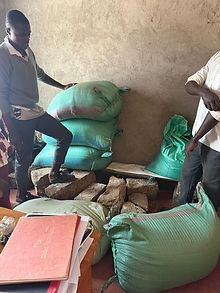
FOOD
We provided food for the entire school for Term 3, ensuring every student could attend classes.
RESULTS
-
Attendance immediately rose to 100%, and for the first time in months, the classrooms were full.
-
Teachers told us they could see the difference as students are more focused, calmer, and eager to learn.

BLACKBOARDS
We installed new blackboards in every classroom after finding that the old ones had completely fallen apart.
RESULT
-
Teachers have upgraded classrooms for instructing their students.

WATER
We fixed the school’s water challenges by providing gutters and water tanks.
RESULT
-
The schools now have reliable access to clean water.

SANITARY PADS
For the girls, we provided a full year’s supply of sanitary pads and underwear.
RESULT
-
We removed one of the biggest barriers to schoolgirls' attendance and dignity in school.

SOCIAL-EMOTIONAL LEARNING
Alongside these improvements, we implemented our SEL-based mental health curriculum with both teachers and students.
RESULTS
The results have been powerful. Teachers report:
-
Increased confidence among students
-
Higher school attendance
-
Noticeable growth in self-esteem
-
A significant reduction in indiscipline cases
-
A decrease in drug use
-
Students showing up cleaner, prouder, and more self-aware
The change is visible in the way students speak, the way they relate to each other, and the way they see themselves. Students are learning to speak up, support one another, and see themselves in a new light. We have also watched teachers grow more confident and emotionally aware.
Communities that once stayed silent about emotional pain are now starting to heal and connect.
At the end of the school session, the whole school came together to present us with “Baobab Tree of Love” filled it with all the things they learned from us this semester:
Happiness
Guidance
Peace
Care
Role model
Generosity
Mental health
Love
Mercy
Kindness
Help
Support system
Giving hearts

When we received the students' grades for Term 3 and compared them to the previous Term 2, prior to Baobab's involvement, we were delighted to discover their grades had improved: the Term 2 mean grade was a D, whereas the Term 3 mean grade was a C-!

Our work in Meru at Mituntu Day Secondary School shows what’s possible when teachers and students come together around mental health. Additionally, our work has shown what happens when mental health support goes hand-in-hand with meeting basic human needs.
What began as a small pilot has grown into something powerful: a model for how Kenyan schools can nurture both hearts and minds.

HOW YOU CAN HELP
VOLUNTEER
When you volunteer with us, you become part of a movement that’s redefining what mental health looks like in schools across Kenya.
Whether you’re leading storytelling circles, supporting field programs, helping with logistics, or sharing your professional skills, your time and energy make a real difference.
We welcome people who are passionate about wellbeing, education, and community. You don’t need to be a therapist or a teacher, just someone who believes in compassion, learning, and the power of connection.
PARTNER
Every school, teacher, and student we reach is part of a larger ecosystem of care - one that grows stronger through collaboration. We invite organizations, schools, and individuals who share our vision to join us in creating emotionally healthy learning environments across Kenya.
Partnership for us means more than funding. It means walking together, sharing knowledge, resources, and heart to build a future where mental health is seen, valued, and supported in every classroom. We work with local and international partners who believe, as we do, that education and mental health are deeply connected. If you’d like to explore partnership opportunities whether through funding, research, program collaboration, or in kind support, we’d love to connect!
DONATE
Every act of generosity has the power to transform lives. Your sponsorship helps us reach
more schools, support more teachers, and give more students the chance to learn, heal, and thrive.
Across Kenya, many children struggle to stay in school because of challenges linked to
poverty, trauma, and emotional distress. Teachers are doing their best, but they often lack
the tools and resources to support students’ mental health. Through your sponsorship, you
become part of changing that story.
Your support helps us:
-
Train teachers in mental health and social-emotional learning.
-
Run storytelling and resilience building sessions for students.
-
Provide food, clean water, and menstrual health supplies for schools in need.
-
Install learning materials and create safe, dignified classrooms.
-
Expand our nature based and community healing programs.
When you sponsor Baobab’s programs, you’re not just funding activities - you’re investing in dignity, hope, and the next generation’s emotional wellbeing. Whether you choose to sponsor a single school, a mental health training cycle, or a full community program, your contribution creates lasting impact.
We are currently in the process of setting up our 501(c)3, so please contact us for more information about how to send a donation and receive a letter for your tax records.








